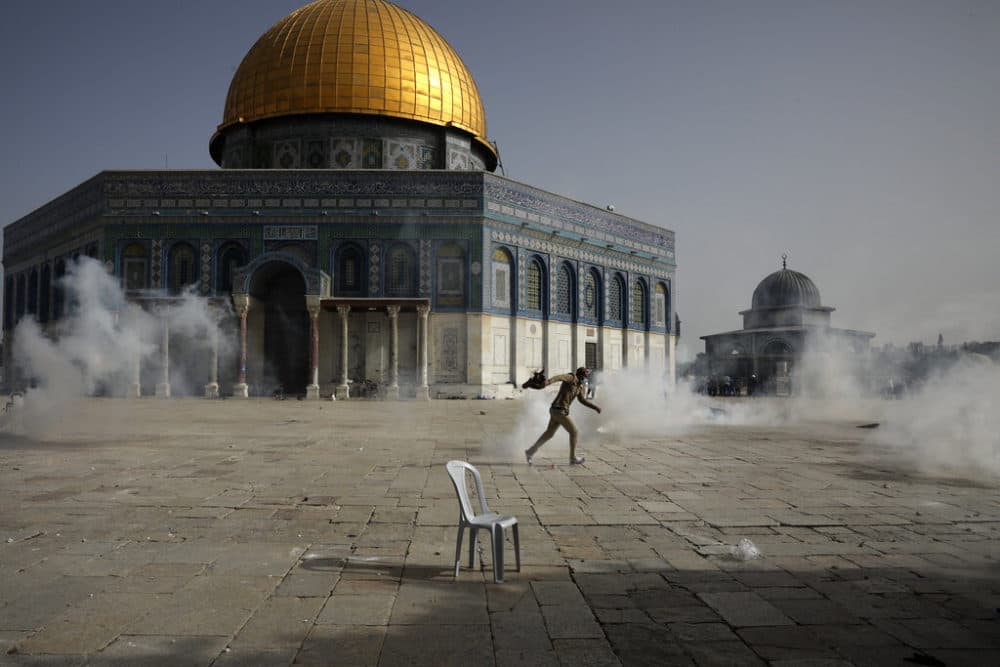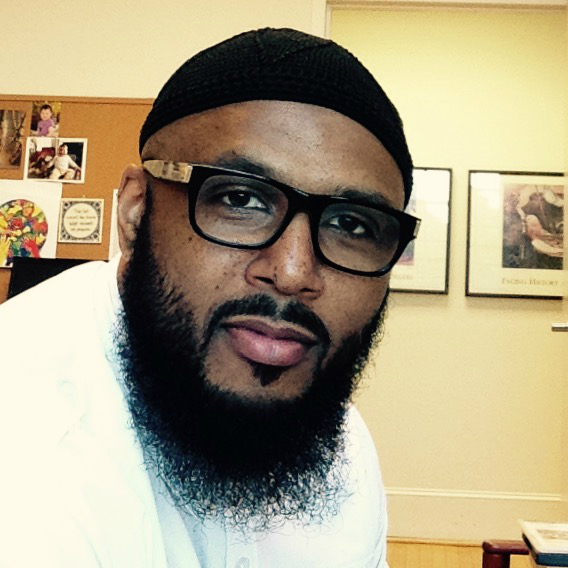Advertisement
Commentary
I'm a man of faith. But I don't know if I believe anymore that peace is possible

I believe Israel has a right to exist. I believe in the humanity of the Jewish people and in their need for allies. I’ve spent more than a decade as a friend to Jews and Jewish causes.
Indeed, as an imam, I have often defended Israel when speaking with my fellow Muslims. My approach means navigating accusations of being a pawn in the Jewish game to use Muslim leaders to normalize Israel’s occupation. Once when participating in an interfaith event, I hosted a group of Jewish families in a mosque. After the event, a Muslim man stopped me and said, “Brother, there will never be peace between us and them. Never!” I dismissed him as a pessimist.
The violence we’re witnessing in Jerusalem this week, though, where hundreds of Palestinians have been injured or worse, has shaken me.
Palestinians were injured by Israeli armed forces when they attacked one of Islam’s most holy mosques (Al Aqsa), in the middle of Islam’s most holy month (Ramadan), during Islam’s most sacred week (Eid week). It’s unconscionable.
It makes me wonder how long can I look through a spiritual lens to contextualize political oppression.
The more emboldened Israel grows, the more they alienate well-wishers like me --forcing neutral people to take a side against them. It makes me unsure that the man I believed to be a pessimist was wrong. It makes me wonder how long can I look through a spiritual lens to contextualize political oppression.
As an imam, I have an obligation to speak the truth. When I look at recent acts of violence — Palestinian children being pressure-hosed by Israel Defense Forces, worshippers being kicked in the head while in prayer, women being dragged by their head-scarves — I have to decide between silent hope and ignoring reality. I fear I may be questioned before God about my silence in the face of blatant oppression. I am compelled, therefore, to speak out against Israel’s violence, possibly at the cost of some dear friendships with Jewish colleagues.
Israel claims to be the only democracy in the Middle East, yet it engages in some of the same tactics that the world has condemned when carried out by others in the region. Military police confronting protestors who demand basic human rights, enforcing curfews through physical violence, and demolishing entire neighborhoods in search of a few men. It’s a double standard.
Advertisement
I know Israel is not responsible for all of Palestine’s woes. The Palestinian people have been oppressed for nearly 500 years — starting with the Ottomon Empire in the early 1500s, before the British, the Jordanians, and finally, since the late 20th century, the Israelis. When we consider the traumatic history of the Jewish people, and the horrors of the Holocaust, we must also consider the collective transgenerational trauma of the Palestinians.
And yet, we hear so much about the violent tactics some Palestinian groups engage in. Those are the headlines the news media writes. I wish the world would also see the non-violent approaches the Palestinian people have taken. Refusing to pay taxes on property and businesses, advocating that all shops close their doors at noon to honor a national commercial strike, a campaign to boycott Israeli products, and advocacy to disregard their identity cards as a means of demonstration.
As a Black man, I can only imagine the smoldering anger that might have spilled over into the streets if the bus boycotts, sit-ins, marches and freedom rides had not activated public policies that would bring some social relief — albeit limited — to African Americans. I’m not advocating the use of violence or justifying it. I’m speculating on how centuries of oppression affect the human spirit.
Every sovereign land has a right to defend itself. And there have been times when Israel has been justified to react with force to protect the lives of its people. But when they decide to engage force, they must do it within reason and without prejudice. A leading rabbi who is an open Zionist once told me over dinner that because Muslims have historically been conquerors, it’s difficult for them to adjust to being citizens, and because Jews have historically been oppressed it’s difficult for them to take the role of leadership. His words ring true to me today as I watch the news in horror, my thoughts oscillating between speaking out and being labeled anti-Semitic — or being silent and living in dread because of it.
I’m not advocating the use of violence or justifying it. I’m speculating on how centuries of oppression affect the human spirit.
I’m no expert on the Israel-Palestine conflict, but I’ve decided this. If in fact, God has chosen Israel to be a leader of nations as many of its citizens believe, then He most certainly has tested them with the presence of the Palestinians, who are just as resilient, God-fearing and determined. As a world-leader and self-proclaimed democracy, Israeli leadership must not fail in carrying out a tempered response to whatever threats perceived or imagined that their country faces.
Being Black in America has made me repulsed by injustice of all kinds. I’ve lived my entire life being treated as a second-class citizen in a country I love; I’ve even experienced racism and prejudice in my own Muslim community. I’d be remiss to not hold Israel accountable for failing to live up to its highest ideals.
I think often about the Muslim who told me there’d never be peace. While I acknowledge his pain, I do not want to become him. As long as I live, I am committed to the process of trying to bring peace through justice, service and truth-telling, at whatever cost it may bring.
Eid should be the most festive day of the Muslim calendar. Instead, while breaking our fast and gathering for prayers, we’ll all be silently in mourning. Not only for our Palestinian brethren but for the Middle East and its people, who haven’t had a moment to breathe in hundreds of years.
